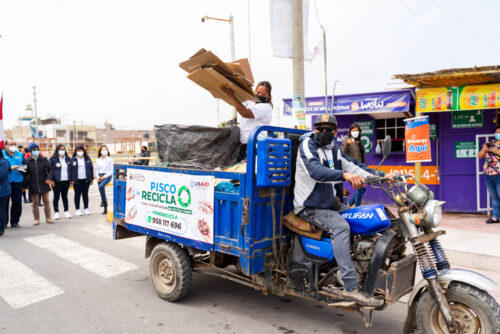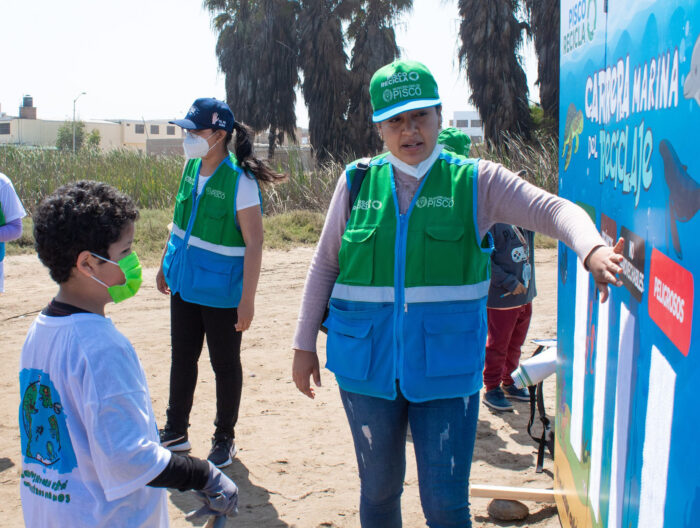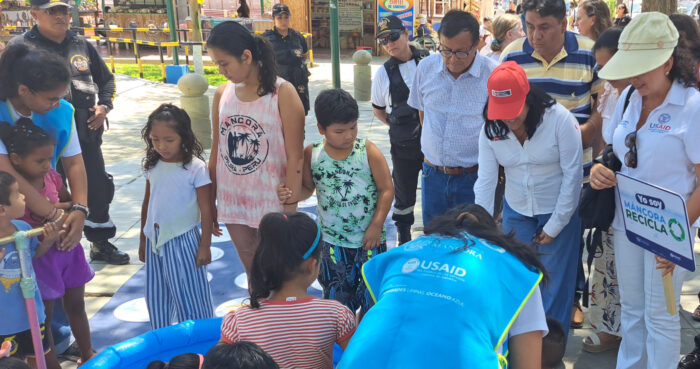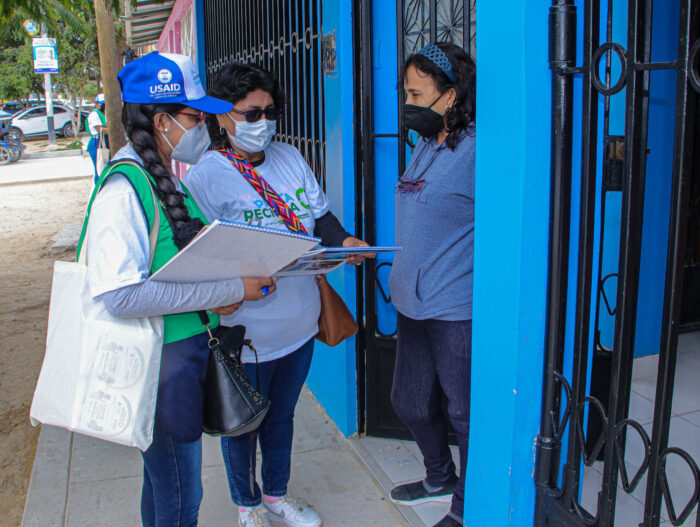From the Field: Increasing Community Recycling and Recovery of Waste to Reduce Ocean Plastic Pollution

Nationwide, in Peru, over 21,000 metric tons of municipal solid waste is generated daily; with 70 percent of that waste—much of it plastic—that’s considered either recyclable or reusable, only 4 percent is actually recycled. Improving low recycling rates requires a multi-pronged approach: addressing local governments’ capacity to provide recycling collection services, increasing community awareness and knowledge, and strengthening recycling markets to improve the economic sustainability of recycling.
Local governments are responsible for providing solid waste management services such as waste collection and disposal—arguably one of the most visible municipal services that has the greatest direct impact on people’s lives. Local governments are also best positioned to facilitate and promote recycling programs within their jurisdiction to prevent that waste, especially plastic, from damaging the environment and entering our ocean.
In 2020, the Government of Peru passed an amendment to its Comprehensive Solid Waste Management Law to prioritize circular economies, promote the recovery and recycling of waste, and generate a more stable supply of recyclable materials. The law mandates segregation of solid waste at the source of origin—in households, businesses, etc—and requires the transfer of that segregated material to formal recycling associations or other authorized solid waste operators. The law also mandates that municipalities create segregation programs within their jurisdiction. According to Ciudad Saludable, a non-profit working on waste management in Peru, one of the primary challenges in advancing local recycling efforts is inconsistent behavior and cultural norms around municipal waste collection. To build support for national policies that promote recycling and reuse of materials, local public awareness campaigns are an important component of the Government of Peru’s efforts to maintain a reliable supply of recyclable material—to segregate domestic waste and stabilize prices for recyclable materials.
USAID’s Local Approach to Increase Community Recycling
Since November 2021, USAID’s Clean Cities, Blue Ocean—the U.S. Agency for International Development’s (USAID) flagship program to address ocean plastic pollution under the Save our Seas Initiative—has been working with the municipal governments, program-awarded grantees, businesses, and local communities in the cities of Paita, Máncora and Pisco to improve local waste systems and increase uptake of the 3Rs—reduce, reuse, recycle. To date, more than 67,000 households are now participating in or benefitting from new and improved solid waste services through their local government’s partnership with USAID.
At the start of USAID’s engagement, Clean Cities, Blue Ocean worked closely with the local governments in each of the three cities to facilitate a Solid Waste Capacity Index for Local Governments (SCIL), a USAID-developed tool that enables local governments to self-assess their current waste management capabilities—to help prioritize and inform future actions that can improve the overall waste management system. The SCIL identified a range of recommendations including improving waste collection services and routing in the three cities, as well as increasing community participation and involving the informal waste sector in the solid waste management planning process.
To address these recommendations, Clean Cities, Blue Ocean partnered with the three municipalities to support them in developing and launching “Recicla” or recycle programs—to increase current segregation rates from 3 to 40 percent by March 2023. The Recicla programs encourage households and businesses to segregate their waste, which are serviced door-to-door by recyclers’ associations, made up of organized, informal waste collectors. Each Recicla program worked with local recycling associations to register participants and promote waste segregation at source—in households, markets, schools, and other large waste generators such as hotels. The program also provided recycling bins at strategic locations for households and businesses to easily drop their segregated waste to be collected by the recycler associations. To encourage participation, the Recicla program leveraged public events with members of the community, including youth, to generate awareness and educate the public on the benefits of waste segregation and recycling.
Pisco was the first city to roll out the Recicla program, and since September 2022, and in its first six months nearly 2,200 households and 200 businesses are now participating. Clean Cities, Blue Ocean worked closely with members of the recyclers association to accompany them in their collection routes and identify opportunities to improve the collection logistics—such as the development of a loading cart. Adapted from a market trolley, the cart enables the recyclers to collect the recyclables more easily and efficiently. The recyclers participating in the program have responded very positively, noting improvements to their livelihoods. Several public events have helped encourage community participation, including the launch of a school recycling contest called “Reciclatón” that involved 13 schools and reached more than 400 children and teachers.

In Mancora, more than 940 households and over 180 businesses are participating—and is the first time household recyclable materials are being collected in the city. As part of the program, recyclers received new uniforms to distinguish and formalize their collection work, which has resulted in greater community participation. Local taxi driver associations also volunteered to participate in the campaigns to generate awareness on community recycling. Clean Cities, Blue Ocean organized several public events including multiple school contests, one of which challenged more than 30 elementary level children to create costumes, sculpture, and theater around the theme of recycling—to promote ideas of responsible consumption, reduce the use of single-use plastics, and generate awareness of waste segregation through art. Other events involved a parade that coincided with Mancora’s 114th anniversary to encourage households and businesses to register for the Mancora Recicla program; a “Clean Neighborhood Contest” that fostered healthy competition among local neighborhoods and featured an award ceremony for the cleanest community in Mancora; and most recently in February, a festival to promote the importance of community recycling that included participation by the Minister of Environment and Mayor of Mancora. At the festival, the Minister invited everyone to “ride the wave of recycling.” She added that “programs like this are the ones we should have throughout the country including in the municipalities. While it is true that waste management is the responsibility of local governments, institutions (public and private) can help enhance that effort.”

In Paita, in the first three months, more than 2,160 households and 300 businesses are participating. Similar public events were held including a school recycling contest, where 13 schools collected almost four metric tons of recyclables—with the winning school awarded a permanent recycling station. A community environmental film event was also held in the central Plaza Mayor Ciudad Roja del Pescador, with the participation of more than 50 people, including children and adults.

Impacts
The Recicla programs are on track to meet the goal of increasing current segregation rates in each of the three cities from 3 to 40 percent by March 2023. In the three cities combined, more than 5,300 households are participating (not including businesses), and an estimated 112 metric tons of recyclable material has been collected.
The Recicla programs are one of several ways that USAID is designing and implementing holistic strategies in Peru to address each step in the waste value chain—from production to end use—prioritizing the most inclusive, economically viable, and environmentally sustainable solutions. To date, Clean Cities, Blue Ocean’s combined efforts in Peru have:
- Secured over 2,000 metric tons of plastic and other low-value waste from leaking into the environment through local recovery, recycling, and collection efforts—including the Recicla programs.
- Benefitted more than 67,000 households that are now participating in or benefitting from new and improved solid waste services through their local government’s partnership with CCBO. This includes the Recicla programs, as well as improved local waste collection to extend services to previously unserved parts of the cities.
- Reached nearly 1.3 million people through program interventions and outreach to improve their waste services and increase their awareness of ocean plastic impacts and solutions.
- Awarded over $650,000 in grant funding to local organizations to implement effective, locally-led waste management solutions.
Learn more about Clean Cities, Blue Ocean’s work in Peru here.
Clean Cities, Blue Ocean is part of the Save Our Seas Initiative—USAID’s flagship initiative to combat ocean plastic pollution globally. Designed to support implementation of the Save Our Seas Act 2.0 of 2020, this initiative is supporting 14 country and regional programs in key geographies that represent 40 percent of total global mismanaged plastic waste. By strengthening waste management and advancing or building circular economies, city by city, USAID builds sustainable solutions that reduce ocean plastics while empowering vulnerable populations and mitigating pollution that affects human health and our climate.

